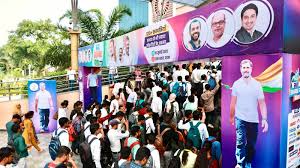Job promises rain down in poll-bound Bihar. But what does the pursuit of one look like?

As election fever grips Bihar once again, a familiar script is unfolding. Political leaders, crisscrossing the state with flashy roadshows and booming speeches, are making one promise louder than any other—jobs. From government vacancies to startup incentives, employment is the top currency in campaign pitches. Yet, beyond the rhetoric and roaring crowds, lies a quieter, more sobering story—of Bihar’s youth chasing jobs that often remain out of reach.
The Evergreen Job Pitch
In Bihar’s electoral politics, employment has long been the favourite bait. In 2020, Tejashwi Yadav promised 10 lakh government jobs. Chief Minister Nitish Kumar, not to be left behind, countered with his own vow to create over 20 lakh employment opportunities. Five years later, those promises have been recycled—with new packaging.
At a recent rally in Patna, a senior leader of a national party claimed, “Every educated youth in Bihar will get a job if we are voted to power.” The crowd erupted in applause, yet many young listeners like Satyam Kumar, a graduate from Nalanda, listened with skepticism.
“I’ve been hearing the same thing since I was in school,” he says. “Now I have two degrees, and I still spend every day filling online forms.”
The Form-Fill Culture
In Bihar, securing a government job is often seen as a golden ticket—not just for income, but for status, stability, and marriage prospects. As a result, an entire generation has become intimately familiar with a complex world of application forms, entrance exams, coaching centres, and waiting lists.
“I’ve spent nearly ₹1.2 lakh on competitive exam preparations over four years,” says Poonam Kumari, a 27-year-old from Gaya. “Still, my results are either delayed, or the exams get cancelled.”
Her experience reflects a wider trend. Recruitment exams in Bihar frequently face delays, legal challenges, or even cancellation due to allegations of cheating or paper leaks. The 2022 Bihar Police Constable exam was postponed multiple times, leaving thousands of candidates in limbo.
Promises vs. Ground Reality
Despite campaign promises, the actual data on job creation paints a bleak picture. According to the Centre for Monitoring Indian Economy (CMIE), Bihar had one of the highest unemployment rates among youth in 2023, hovering near 18%. Government vacancies across departments—education, police, health—have accumulated over the years, but hiring has been slow or absent.
Even when positions are announced, bureaucratic red tape often hinders the process. “There are over 1.5 lakh vacant posts in the education sector alone,” says education activist Anjani Verma. “But recruitment gets stuck for months due to procedural gaps or court cases.”
Coaching Hubs: The Parallel Economy
In Patna’s Rajendra Nagar and Kankarbagh, buildings are plastered with advertisements for SSC, BPSC, Railways, and UPSC coaching centres. These hubs have become part of Bihar’s informal economy—feeding off the aspirations of youth.
“There are more coaching centres than actual jobs,” jokes Ravi Singh, who runs a tea stall near a coaching complex. “But I make a living because they keep coming.”
These coaching centres, while helpful for preparation, have also become symbols of a system where job readiness is more business than outcome. Many candidates prepare for five to six years with no job to show at the end, often ageing out of eligibility criteria for certain posts.
Private Sector? Not Quite There Yet
While leaders often promise boosting private sector jobs, Bihar’s industrial growth remains slow. Poor infrastructure, limited power supply, and weak investor confidence have kept large industries away. As a result, migrant jobs—especially in construction, transport, and textiles in other states—remain the default option for many.
“I studied mechanical engineering,” says Rakesh Paswan from Muzaffarpur, “but I’m working as a delivery boy in Delhi. It pays the bills, at least.”
The return of migrants during the 2020 COVID lockdown briefly sparked discussion on generating local employment, but momentum faded quickly. Today, many of those workers are back in metro cities, with little faith left in local promises.
A Voter’s Dilemma
With all major parties offering job guarantees in their manifestos, the average Bihari voter finds it hard to separate promise from performance. “We want jobs, but we also want honesty,” says Noor Jahan, a post-graduate student in Bhagalpur. “Every party says the same thing, but none of them have delivered fully.”
Civil society groups are urging youth to ask more detailed questions—not just about how many jobs, but how they will be created, which sectors, and within what timelines.
What Needs to Change
Experts say Bihar needs a multi-pronged strategy:
- Speed up public sector hiring by resolving legal and administrative delays.
- Invest in vocational and skill development tailored to local industries.
- Create incentives for small-scale industries and digital entrepreneurship.
- Modernize agricultural employment, which still sustains over half the population.
Long-term success will also depend on improving education quality at the school level, strengthening local governance, and improving internet access in rural areas.
Conclusion
As Bihar prepares to vote, jobs remain the most potent promise in a state yearning for economic upliftment. But the gap between lofty promises and lived reality has never been starker. The pursuit of a job in Bihar today is not just an economic journey—it’s an emotional, financial, and social trial.
And while leaders trade statistics and speeches, young Biharis continue to chase stable employment—with hope in their hearts, and doubt in their eyes.






